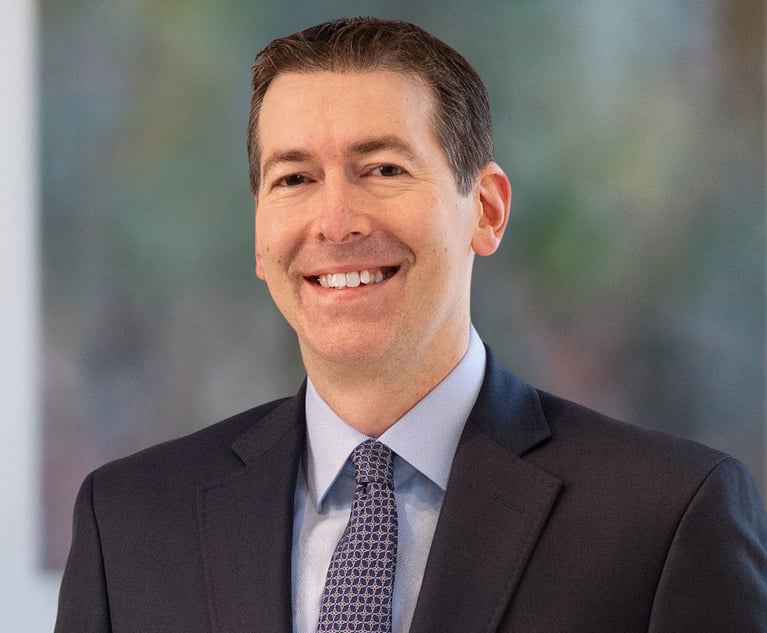Veteran Law Firm Well-Being Pros Offer Tips on Building Programs, Getting Buy-In
"I need to have metrics behind it that show the success," said Kathleen Pearson, the chief human resources officer at Pillsbury, speaking on a panel as part of a daylong Conference Board event on mental health and addiction issues in the legal profession at Wilson Sonsini Goodrich & Rosati's San Francisco office.
January 22, 2020 at 03:49 PM
7 minute read
 (Photo: shutterstock.com)
(Photo: shutterstock.com)
 What are the best practices for building a program to address the stresses of working in a large law firm?
What are the best practices for building a program to address the stresses of working in a large law firm?
Administrators from Wilson Sonsini Goodrich & Rosati and Pillsbury Winthrop Shaw Pittman detailed their firms' decadelong efforts to build well-bring programs as part of a conference on emotional well-being in the legal profession in San Francisco Tuesday.
Nancy Dolan, who helps lead professional development at Wilson Sonsini, which hosted the event, and Kathleen Pearson, the chief human resources officer at Pillsbury, spoke on a panel titled "Proactive Approaches to Enhancing Well-Being in YOUR Law Firm" as part of the daylong event sponsored by the Conference Board. They were joined on the panel by moderator Jan Dubin, a consultant and the chief growth officer at the focus, engagement and resilience training company LifeXT, and the company's CEO, Brenda Jacobsen.
Dubin opened up the conversation by pointing to a 2018 survey that listed law as the loneliest profession and a 2017 Brigham Young University study that found loneliness has the equivalent negative health impact of 15 cigarettes per day.
"The point is not to scare," Dubin said. "The point is taking action."
"It's impressive that we can find law firm well-being programs that span a period of time over 10 years," Dubin said. But she cautioned audience members from firms that might just be ramping up their efforts that "these programs weren't built in a day."
Addressing Stress, Not Getting Rid of It
Wilson Sonsini's Dolan said that her firm's program was informed by her own engagement with mindfulness training during a difficult stretch of work that coincided with her ex-husband's battle with meth addiction. At that time the firm was recruiting many lawyers with advanced degrees, including doctorates in the sciences, who were "fascinating, smart people" who weren't succeeding at the firm.
"They were leaving before they could fail," Dolan said.
Dolan said the firm has been exploring the communication style of its attorneys using the DISC personality types (dominant, inspiring, supportive, and cautious) since before she arrived in the late 1990s. The firm launched its "Handling Emotions Under Pressure" program in 2007 and piloted a new class on handling stress for the firm's information technology help desk in 2008. More recently the firm in February 2018 launched its "Resilience" curriculum, which integrates lessons on mindfulness and emotional intelligence as they relate to the practice of law.
"We need to remind ourselves, and everybody else at our firms, what's available," Dolan said. She also added a word of caution she received from a meditation teacher: "If you think this is going to get rid of stress, stop now."
Finding the Culture Fit
Pillsbury's Pearson pointed out that her firm's well-being efforts come from the human resources department as opposed to Wilson Sonsini's, which are housed in professional development. LifeXT's Jacobsen later noted that still another firm housed its programs in its "innovation" arm.
"Think about your own culture and what would work in your firm and what small step you can take," Pearson told audience members. She said her firm had relaunched its wellness efforts in 2017 with a team-based approach. An initial effort focused on getting employees up and moving included a "golden shoe" step-counting challenge that had people in its Nashville office climbing some multiple of the steps in the Empire State Building.
The firm also offered biometric screening to all employees and gave them $150 gift cards simply for delivering the results to their primary care physicians. Pearson says in the year after the gift card program the firm's health plan came in at 82% of its budget and the firm was able to keep health care premiums from climbing.
"I need to have metrics behind it that show the success of it," Pearson said. "This is the tangible result … we're not having our rates going up and not having these catastrophic payouts we've had in the past."
Divided Attention
LifeXT CEO Jacobsen said that "business performance is only driven by human performance" and that addressing issues of stress management and focus in those terms is a "CFO-proof" way of coming at employee well-being. She said that her company tends to focus more on "episodic stress" and general working conditions than the types of mental health issues that require clinical intervention.
She asked audience members to stand and close their eyes and then asked them to sit down if they hadn't had a moment or thought of stress related to work, family or money within the past week, then day, then hour. The whole room remained standing. She called this an illustration of an "open secret" which stands in stark contrast to the curated, positive view of people's lives that we tend to observe via social media.
"It makes it easy to think that you're in this position alone," she said.
Jacobsen said that our brains and bodies are currently "running complex software on an outdated hard drive" and that we still respond to stress in the same biological way as our prehistoric ancestors did when faced with potential predators in the wild. Where vigilance, anxiety, and a bias toward the negative proved useful to early human survival, she said those instincts become problematic when confronting modern stresses and forms of communication.
"Today the reality is that we're rarely ever fully off or on, so we're constantly in this state of partial attention," she said. Jacobsen said the research shows that people tend to respond to notifications such as text messages, emails and instant messages within minutes, but that it takes an average of 23 minutes to refocus after responding. Jacobsen said that the good news is that we're learning more about neuroplasticity, the brain's ability to be retrained.
"We're using mindfulness training to increase an individual's ability to recover from stress," she said.
'From the Top'
Addressing a question from the audience, the panelists said that it was important, especially in the context of a law firm, to have the support of key leaders. They also said to expect skepticism from certain partners who question the value of such programs. Pillsbury's Pearson said that her firm chairman almost always mentions something going on in the firm's wellness program as part of the annual "state of the firm" address. But, she added, "You're not going to get everyone." There are always going to be those partners who don't go to certain programs, but they're the type that "don't go to anything," she said.
"We all have those," she said. "That's the nature of being a firm."
Jacobsen said that she and her company are typically dealing with people at the managing partner level. "It has to come from the top," she said. "When we get handed off to benefits, unfortunately, we know the conversation is dead."
Read more – Minds Over Matters: An Examination of Mental Health in the Legal Profession
This content has been archived. It is available through our partners, LexisNexis® and Bloomberg Law.
To view this content, please continue to their sites.
Not a Lexis Subscriber?
Subscribe Now
Not a Bloomberg Law Subscriber?
Subscribe Now
NOT FOR REPRINT
© 2025 ALM Global, LLC, All Rights Reserved. Request academic re-use from www.copyright.com. All other uses, submit a request to [email protected]. For more information visit Asset & Logo Licensing.
You Might Like
View All
Law Firms Look to Gen Z for AI Skills, as 'Data Becomes the Oil of Legal'


Orrick Hires Longtime Weil Partner as New Head of Antitrust Litigation
Trending Stories
- 1Uber Files RICO Suit Against Plaintiff-Side Firms Alleging Fraudulent Injury Claims
- 2The Law Firm Disrupted: Scrutinizing the Elephant More Than the Mouse
- 3Inherent Diminished Value Damages Unavailable to 3rd-Party Claimants, Court Says
- 4Pa. Defense Firm Sued by Client Over Ex-Eagles Player's $43.5M Med Mal Win
- 5Losses Mount at Morris Manning, but Departing Ex-Chair Stays Bullish About His Old Firm's Future
Who Got The Work
J. Brugh Lower of Gibbons has entered an appearance for industrial equipment supplier Devco Corporation in a pending trademark infringement lawsuit. The suit, accusing the defendant of selling knock-off Graco products, was filed Dec. 18 in New Jersey District Court by Rivkin Radler on behalf of Graco Inc. and Graco Minnesota. The case, assigned to U.S. District Judge Zahid N. Quraishi, is 3:24-cv-11294, Graco Inc. et al v. Devco Corporation.
Who Got The Work
Rebecca Maller-Stein and Kent A. Yalowitz of Arnold & Porter Kaye Scholer have entered their appearances for Hanaco Venture Capital and its executives, Lior Prosor and David Frankel, in a pending securities lawsuit. The action, filed on Dec. 24 in New York Southern District Court by Zell, Aron & Co. on behalf of Goldeneye Advisors, accuses the defendants of negligently and fraudulently managing the plaintiff's $1 million investment. The case, assigned to U.S. District Judge Vernon S. Broderick, is 1:24-cv-09918, Goldeneye Advisors, LLC v. Hanaco Venture Capital, Ltd. et al.
Who Got The Work
Attorneys from A&O Shearman has stepped in as defense counsel for Toronto-Dominion Bank and other defendants in a pending securities class action. The suit, filed Dec. 11 in New York Southern District Court by Bleichmar Fonti & Auld, accuses the defendants of concealing the bank's 'pervasive' deficiencies in regards to its compliance with the Bank Secrecy Act and the quality of its anti-money laundering controls. The case, assigned to U.S. District Judge Arun Subramanian, is 1:24-cv-09445, Gonzalez v. The Toronto-Dominion Bank et al.
Who Got The Work
Crown Castle International, a Pennsylvania company providing shared communications infrastructure, has turned to Luke D. Wolf of Gordon Rees Scully Mansukhani to fend off a pending breach-of-contract lawsuit. The court action, filed Nov. 25 in Michigan Eastern District Court by Hooper Hathaway PC on behalf of The Town Residences LLC, accuses Crown Castle of failing to transfer approximately $30,000 in utility payments from T-Mobile in breach of a roof-top lease and assignment agreement. The case, assigned to U.S. District Judge Susan K. Declercq, is 2:24-cv-13131, The Town Residences LLC v. T-Mobile US, Inc. et al.
Who Got The Work
Wilfred P. Coronato and Daniel M. Schwartz of McCarter & English have stepped in as defense counsel to Electrolux Home Products Inc. in a pending product liability lawsuit. The court action, filed Nov. 26 in New York Eastern District Court by Poulos Lopiccolo PC and Nagel Rice LLP on behalf of David Stern, alleges that the defendant's refrigerators’ drawers and shelving repeatedly break and fall apart within months after purchase. The case, assigned to U.S. District Judge Joan M. Azrack, is 2:24-cv-08204, Stern v. Electrolux Home Products, Inc.
Featured Firms
Law Offices of Gary Martin Hays & Associates, P.C.
(470) 294-1674
Law Offices of Mark E. Salomone
(857) 444-6468
Smith & Hassler
(713) 739-1250







